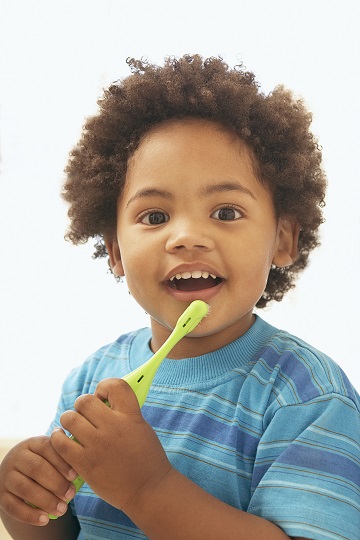Frequently Asked Questions about Children’s Oral Health

Helping your child develop good oral health habits not only benefits their smile, but is also vital to their overall well-being. Cavities are one of the most prevalent diseases among children. If a cavity, or other oral health issue, remains untreated, it can cause discomfort and affect common tasks like eating, speaking and even learning in school. Teaching your child how to properly care for their teeth as well as visiting the dentist regularly ensures that your child keeps their teeth healthy for a lifetime. We’ve put together a list of ten common questions asked about children’s oral health.
1. When should I start brushing my child’s teeth?
You can start good oral health habits from birth. Gently wipe your baby’s gums with a wet washcloth or gauze after feedings. Once teeth emerge, you can use an infant tooth brush and a tiny amount (a smear the size of a grain of rice) of toothpaste to brush your child’s teeth in gently circular motions. You can start flossing as soon as two teeth touch.
2. When should I bring my child to the dentist for the first time?
Your child should visit a dentist for the first time within six months of getting the first tooth, but definitely no later than the first birthday. During your child’s first dental visit, the dentist will check your child’s teeth for decay, review their bite and look for any potential dental problems that may arise in the future. In addition, the dentist will share the basics of a child’s oral health care routine and answer any questions you may have.
3. What is baby bottle tooth decay and how can I prevent it?
Tooth decay in infants and toddlers is known as baby bottle tooth decay. Baby teeth serve an important role in children’s development as they help them chew food and learn to speak, making it a priority to protect them as they are susceptible to cavities. Here are ways to help prevent baby bottle tooth decay:
- Do not share eating utensils with your child. Bacteria in the mouth that cause tooth decay can be passed from parent to child.
- Avoid putting anything other than formula or milk into baby bottles and make sure your child finishes their nighttime or naptime bottle before going to bed.
- Before your child’s teeth come in, always wipe their gums with a damp washcloth after eating.
4. When should I have my child stop using a pacifier?
Many children use pacifiers into their toddler and even preschool years. If your child does not show signs of quitting, you may need to wean them off the pacifier. Long-term pacifier use may lead to future dental problems and even interfere with speech development. Talk with your pediatrician about the appropriate time to cease pacifier use with your child. When the time comes to wean your child from a pacifier, be sure to do it gradually.
5. When can my child start brushing and flossing their teeth on their own?
As a general rule, children should begin brushing and flossing their own teeth when they are able to tie their own shoes, which is typically around age 6. It’s crucial that you still supervise brushing and flossing to be sure they are using proper techniques. You may also allow your child to watch you brush and floss to help teach the importance of good oral health.
6. How often should my child brush and floss their teeth?
The American Dental Association recommends brushing teeth twice a day and cleaning between teeth with floss once a day. Good oral health habits are the foundation to a healthy smile for a lifetime.
7. How often should my child visit the dentist?
Your child should visit the dentist within six months after the first tooth appears or by the child’s first birthday. Ideally, you should take your child to the dentist every six months or as often as recommended by your dentist. Regular dental visits are essential to the health of your child’s developing teeth.
8. How can I prevent my child from getting cavities?
Starting good oral health habits early is the first step in preventing cavities. Always teach children to brush twice each day and floss once a day. Second, regular visits to your child’s dentist will help detect any early signs of tooth decay or other dental disease. They will also check your child’s teeth to make sure they are developing correctly. Remember, baby teeth play an important role in your child’s development and help guide permanent teeth into place so be sure to help your child keep them healthy.
9. How can I encourage my child to brush their teeth?
Here are some fun ways to help encourage your child when brushing their teeth:
- Take your child shopping for a fun toothbrush with their favorite character to help make brushing more exciting.
- Read books or watch children’s shows that talk about the importance of brushing teeth with your child. Use a character from the show or book as an example when it is time to brush to help inspire and encourage them.
- Put together a reward chart and let them add a sticker each time they brush or floss their teeth. Decide on rewards together to help encourage and motivate your child to keep their smile healthy.
- Set a good example for your child by brushing and flossing together and making it a family affair.
10. What are sealants and how can they help my child?
Dental sealants are comprised of a thin, plastic coating that is painted onto the chewing surface of a child’s pre-molars and molars to help prevent tooth decay. The coating dries to form a protective barrier over the enamel of teeth that prevents cavities. Sealants can also help protect vulnerable areas of a tooth that brushing and flossing might miss. They can last up to 10 years and your dentist will check them at every dental visit.


Add comment